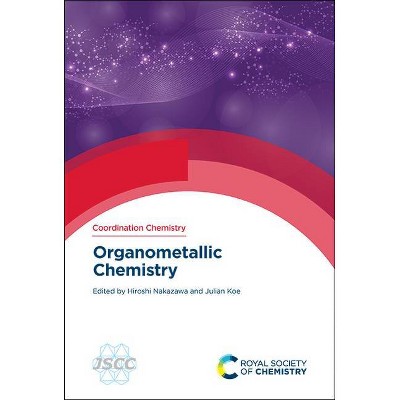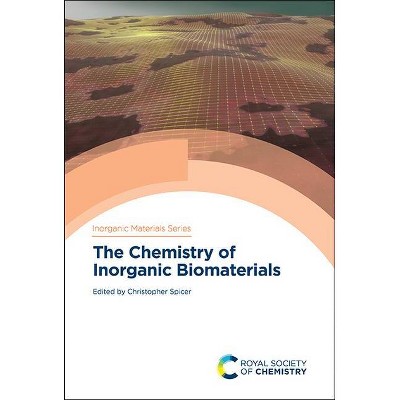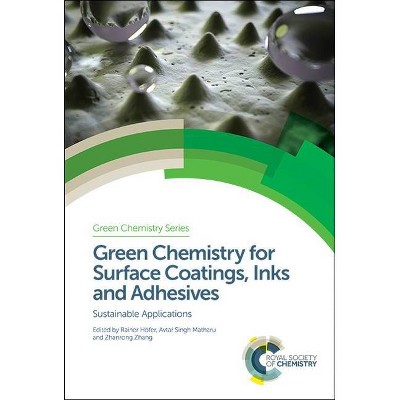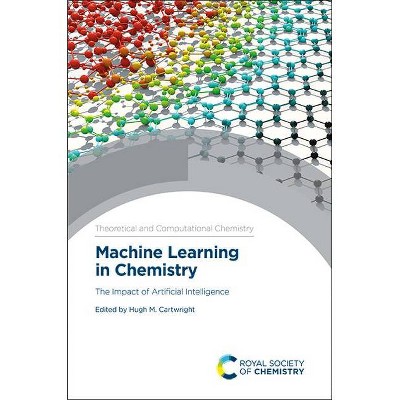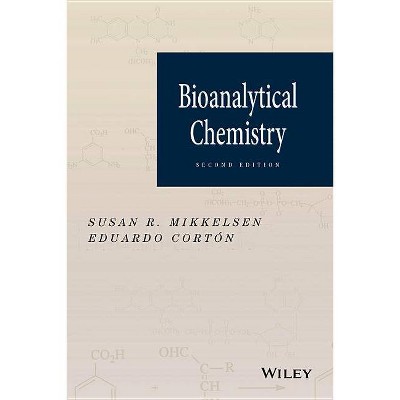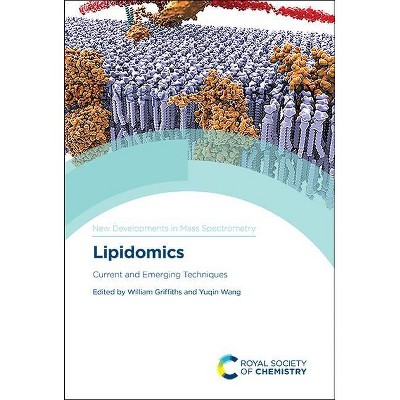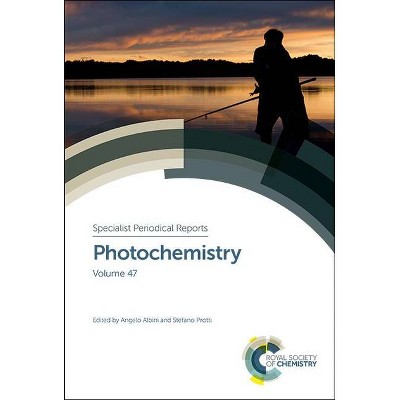Flow Chemistry - (ISSN) by Santiago V Luis & Eduardo Garcia-Verdugo (Hardcover)
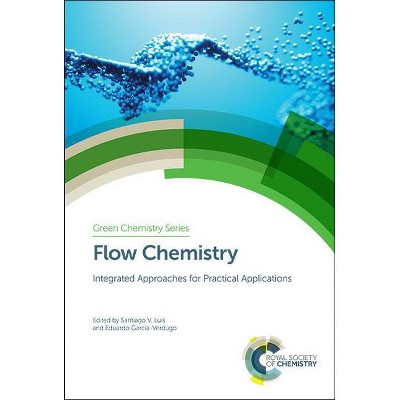
Similar Products
Products of same category from the store
AllProduct info
<p/><br></br><p><b> About the Book </b></p></br></br>In flow chemistry reactions are performed in a reactor with the reactants pumped through it. It has the benefit of being easily scaled up and it is straightforward to integrate synthesis, workup and analysis into one system. This volume provides an update on recent advances in the field of flow chemistry, with special emphasis on new, integrated approaches for green and efficient chemistry.<p/><br></br><p><b> Book Synopsis </b></p></br></br>In flow chemistry reactions are performed in a reactor with the reactants pumped through it. It has the benefit of being easily scaled up and it is straightforward to integrate synthesis, workup and analysis into one system. This volume provides an update on recent advances in the field of flow chemistry, with special emphasis on new, integrated approaches for green and efficient chemistry. This book is a valuable resource for researchers in green chemistry, chemical engineers and Industrial chemists working in the pharmaceutical and fine chemicals industries.<p/><br></br><p><b> From the Back Cover </b></p></br></br><p>Historically pharmaceutical and fine chemical products have been synthesised using batch methods, but increasingly chemists are looking towards flow chemistry as a greener and more efficient alternative. In flow chemistry reactions are performed in a reactor with the reactants pumped through it. It has the benefit of being easily scaled up and it is straightforward to integrate synthesis, workup and analysis into one system. Flow chemistry is considered a greener alternative to batch chemistry because it is easier to control and minimise hazardous intermediates and by-products. There is significant interest in the use of flow chemistry both in the lab and on an industrial scale.</p> <p>Flow Chemistry provides an update on recent advances that have been made in the field. Particular emphasis is given to the new integrated approaches that bring together several elements to implement flow processes as a regular green chemistry tool for the chemical industries. With chapter contributions from several well-known experts in the field, this book is a valuable resource for researchers working in green chemistry and synthesis, chemical engineers and industrial chemists working in the pharmaceutical and fine chemicals industries.</p><p/><br></br><p><b> Review Quotes </b></p></br></br><br>Come ogni argomento "alla moda" che si rispetti, la chimica a flusso sta occupando sempre più spazio nelle pubblicazioni scientifiche. Anche la RSC segue il trend, dedicando l'ultimo numero della sua collana "Green Chemistry" proprio a questa tematica con il volume: "Flow Chemistry - Integrated Approaches for Practical Applications", curato da edito da Santiago Lafuente Luis e Eduardo García-Verdugo Cepeda, entrambi professori dell'Università valenziana Jaume I. <br>Il volume, in 17 capitoli, approfondisce gli aspetti più innovativi che la ricerca sulla chimica a flusso sta evidenziando, mantenendo sempre l'attenzione sulla sostenibilità dei processi descritti. <br>La prima parte del libro è quella che si focalizza di più sugli aspetti intrinsecamente chimici della chimica a flusso. In questa sezione, gli approcci sperimentali necessari per sfruttare al massimo le specifiche caratteristiche della chimica a flusso, come ad esempio l'elevato controllo della temperatura, del tempo di reazione e del trasferimento di materia, vengono descritte in maniera dettagliata, per raggiungere risultati impensabili fino a 10 anni orsono. In tale ottica vengono quindi discussi sia settori generali, come la catalisi di processi continui (Cap. 1), la biocatalisi (Cap. 2), la chimica organometallica (Cap. 3), la fotochimica (Cap. 4) e l'elettrochimica a flusso (Cap. 5), sia ambiti più specifici come la funzionalizzazione dei legami C-H (Cap. 6). <br>Nella sezione centrale del volume, l'enfasi si sposta sull'ampio settore dei "materiali", sia nell'ottica di un loro processo di preparazione (vedi quindi la polimerizzazione radicalica del capitolo 7 o ionica del capitolo 8 e la preparazione dei nanomateriali del capitolo 9), sia nell'ottica più tecnologica del loro uso nei sistemi di reazione (vedi l'analisi NMR in continuo tramite micro-bobine del capitolo 10 o i sistemi di reazione a membrana del capitolo 11). Aspetti che iniziano ad evidenziare come l'ambito chimico e l'ambito tecnologico-ingegneristico tendano a sovrapporsi in un campo così multidisciplinare come la chimica a flusso. <br>Aspetto ingegneristico che si pone in primo piano nella terza parte del volume (capitoli dal 12 al 14). Qui, gli esperti del settore introducono ed approfondiscono la progettazione, la produzione e le proprietà specifiche dei più innovativi micro-reattori oggi studiati, evidenziandone gli aspetti caratteristici, le teorie matematiche alla base delle loro performance e gli ambiti pratici dove sfruttarne a pieno gli aspetti positivi e minimizzando quelli negativi. <br>Meno raggruppabili, ma non meno interessanti, sono gli ultimi 3 capitoli del volume, in cui vengono approfondite tematiche specifiche. Nel capitolo 15 vengono presentati gli eccellenti risultati ottenuti tramite sistemi automatici di ottimizzazione ed esecuzione di processi in continuo. Nel capitolo 16 invece viene presentato un approccio generalizzabile allo scale-up di un processo a flusso, mentre nell'ultimo capitolo, vengono declinati gli aspetti regolamentati (GMP), caratteristici del mondo farmaceutico, in relazione alle produzioni a processo in continuo. <br>Un testo, quest'ultimo volume, che, parlando di chimica a flusso, raccoglie l'interesse di molti settori, evidenziandone l'importanza e l'interdipendenza in un ambito che solo il nome sembra definirne esattamente la natura. La "chimica a flusso", quindi, come punto di partenza, elemento comune, utile per parlare di aspetti di reattività chimica, applicabilità industriale, tecnologia dei materiali, fisica di base ed economia di scala. Eterogeneità di argomenti che Santiago Luis e Eduardo Garcia-Verdugo, insieme agli innumerevoli co-autori coinvolti, sono riusciti a racchiudere in un volume esplicativo e al passo con le novità, che riuscirà sicuramente a dare risposte a chi cerca aggiornamenti in questo settore.--Guido Furlotti "La Chimica e l'Industria. "<br><p/><br></br><p><b> About the Author </b></p></br></br><p>Santiago V Luis is Professor of organic chemistry at the University Jaume I, Castellon, Spain. <br>He studied Chemistry at the University of Zaragoza and completed his PhD at the University of Valencia in 1983 working on mechanistic studies using functional polymers. After postdoctoral work at the University of Pittsburgh (USA) under the supervision of J. Rebek, in Supramolecular chemistry, he obtained an academic appointment at the University Jaume I in Castellón (Spain) where he is Head of the research group in Supramolecular and Sustainable Chemistry. Research areas involve Supramolecular and Biomimetic chemistry and new tools in Sustainable and Green Chemistry, with emphasis in catalysis and flow chemistry using polymer-supported reagents and catalysts.</p> <p>Eduardo Garcia-Verdugo is Professor of organic chemistry at the University Jaume I, Castellon, Spain.<br>He obtained his chemistry degree at the University of Valencia (1995) and his PhD in chemistry at the University Jaume I (Spain) in 2001. After working as a researcher at Nottingham University (UK) under the supervision of M. Poliakoff (until 2004) as a MSCA fellow, he returned to Spain and worked as a Ramon y Cajal fellow at the University Jaume I until 2009, and then he obtained a permanent position as Cientifico Titular of CSIC at ICP (Madrid) (2009-2010). In 2010, he moved to a permanent academic position at the University Jaume I. Currently, he is working on the integration of different so-called enabling techniques (catalysis, polymeric materials, continuous flow processes, microreactors, bio-catalysis, neoteric solvents (ILs, SCFs)) to develop more efficient and greener organic transformations.</p>
Price History
Cheapest price in the interval: 250 on November 8, 2021
Most expensive price in the interval: 250 on December 20, 2021
Price Archive shows prices from various stores, lets you see history and find the cheapest. There is no actual sale on the website. For all support, inquiry and suggestion messages communication@pricearchive.us

